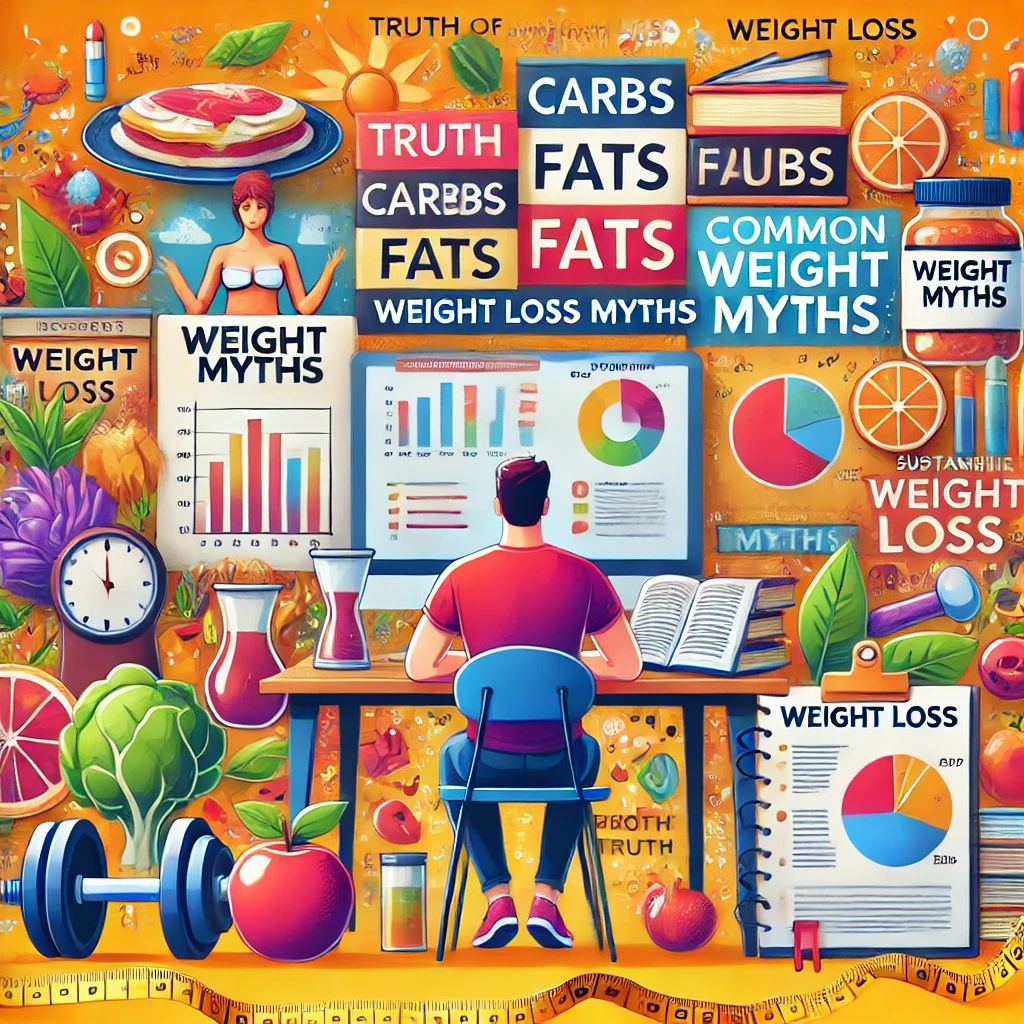
Weight loss is a journey that many embark upon with hopes of achieving a healthier, more vibrant life. However, the path to weight loss is often cluttered with misinformation and myths that can derail even the most dedicated efforts. These myths can lead to frustration, stalled progress, and a lack of motivation. In this article, we will debunk some of the most common weight loss myths, providing you with accurate information to guide you on your journey to a healthier you.
Myth: You Need to Starve Yourself to Lose Weight
One of the most pervasive myths is that extreme calorie restriction is the only way to lose weight. While creating a calorie deficit is necessary for weight loss, starving yourself is not the solution. Extreme calorie restriction can slow down your metabolism, lead to muscle loss, and cause nutritional deficiencies.
The Truth: Sustainable weight loss comes from a balanced diet that provides sufficient calories to support your daily activities while creating a moderate calorie deficit. Focus on nutrient-dense foods that keep you full and satisfied, such as fruits, vegetables, lean proteins, and whole grains.
Myth: Carbs Are the Enemy
Carbohydrates often get a bad rap in the weight loss world, with many people believing that cutting out carbs entirely is the key to shedding pounds. This myth stems from the popularity of low-carb diets, which can lead to quick weight loss initially.
The Truth: Carbohydrates are an essential macronutrient that provides energy for your body. The key is to choose complex carbs like whole grains, legumes, and vegetables over simple carbs found in sugary foods and refined grains. These complex carbs are rich in fiber, which can help regulate blood sugar levels and keep you feeling full longer.
Myth: Eating Fat Makes You Fat
For years, dietary fat was blamed for weight gain, leading many to adopt low-fat diets. This myth persists despite growing evidence that not all fats are created equal.
The Truth: Healthy fats are crucial for your body’s functions, including hormone production and nutrient absorption. Incorporating healthy fats, such as those found in avocados, nuts, seeds, and olive oil, can actually support weight loss by keeping you satiated. The key is to limit unhealthy trans fats and saturated fats found in processed and fried foods.
Myth: Exercise Alone is Enough for Weight Loss
While exercise is a vital component of a healthy lifestyle, relying solely on it for weight loss can be misleading. Many believe that as long as they exercise regularly, they can eat whatever they want and still lose weight.
The Truth: Weight loss is achieved through a combination of diet and exercise. While exercise helps burn calories and build muscle, it cannot compensate for a poor diet. Paying attention to what you eat is equally important, if not more so, than how much you move.
Myth: You Have to Give Up Your Favorite Foods
The idea that you must completely eliminate your favorite foods to lose weight is a common misconception. This can make the weight loss process feel restrictive and unsustainable.
The Truth: Moderation is key. You don’t have to give up your favorite foods entirely. Instead, focus on portion control and enjoying these foods occasionally as part of a balanced diet. Allowing yourself small indulgences can help prevent feelings of deprivation and make it easier to stick to your weight loss plan.
Myth: Weight Loss Supplements Are a Quick Fix
The market is flooded with weight loss supplements that promise quick and easy results. These products often claim to boost metabolism, burn fat, or suppress appetite, appealing to those looking for a shortcut.
The Truth: There is no magic pill for weight loss. Most supplements are not regulated and can have harmful side effects. Sustainable weight loss is achieved through a healthy diet, regular exercise, and lifestyle changes. If you’re considering supplements, it’s best to consult with a healthcare provider first.
Myth: Drinking Water Can Help You Lose Weight
Drinking water is often touted as a simple way to boost weight loss. While staying hydrated is essential for overall health, the belief that water alone can melt away fat is exaggerated.
The Truth: While water can aid in weight loss by helping you feel full and supporting metabolic functions, it is not a standalone solution. Drinking water in place of high-calorie beverages can help reduce overall calorie intake, but it should be part of a broader weight loss strategy that includes diet and exercise.
Myth: Eating Late at Night Causes Weight Gain
Many people believe that eating after a certain time in the evening leads to weight gain. This myth has led to the practice of setting strict eating cut-off times.
The Truth: Weight gain is determined by overall calorie intake and expenditure, not by the timing of meals. What you eat and how much you eat are far more important than when you eat. If you’re consuming more calories than you burn, you’ll gain weight regardless of the time. Focus on healthy eating habits throughout the day rather than stressing over the clock.
Conclusion
Navigating the world of weight loss can be challenging, especially with so many myths and misconceptions. By debunking these common weight loss myths, we hope to provide you with a clearer path toward achieving your health and fitness goals. Remember, sustainable weight loss is about balance, moderation, and making informed choices. Embrace the journey, stay informed, and celebrate your progress along the way. With the right mindset and approach, you can achieve lasting success and a healthier, happier you.


